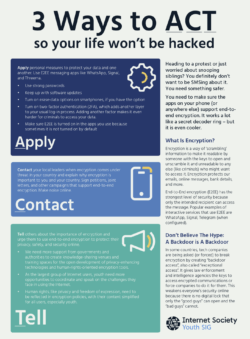Heading to a protest or just worried about snooping siblings? You definitely don’t want to be SMSing about it. You need something safer.
You need to make sure the apps on your phone (or anywhere else) support end-to-end encryption. It works a lot like a secret decoder ring – but it is even cooler.
What Is Encryption?
Encryption is a way of ‘scrambling’ information to make it readable by someone with the keys to open and unscramble it – and unreadable to anyone else (like criminals) who might want to access it. Encryption protects our emails, online messages, bank details, and more.
End-to-End encryption (E2EE) has the strongest level of security because only the intended recipient can access the message. Popular examples of interactive services that use E2EE are WhatsApp, Signal, Telegram (when configured).
Don’t Believe The Hype: A Backdoor is A Backdoor
In some countries, tech companies are being asked (or forced) to break encryption by creating “backdoor access”, also called “exceptional access”. It gives law enforcement and intelligence agencies the keys to access encrypted communications or force companies to do it for them. This weakens everyone’s security online because there is no digital lock that only the “good guys” can open and the “bad guys” cannot.
Want To Stand for Encryption? Here’s Three Ways You Can ACT:
A Stands for Apply
Apply personal measures to protect your data, and one another. Use E2EE messaging apps like WhatsApp, Signal, and Threema. Also, do this:
- Use strong passwords
- Keep up with updates
- Turn on erase-data options on smartphones, if you have the option
- Turn on two-factor log-in (2FA), which adds another layer (like a bank security fob) to your usual log-in process (e.g. a username and password). Adding another factor makes it even harder for criminals to access your data.
- Make sure E2EE is turned on in the apps you use because sometimes it is not turned on by default
C Stands for Contact
Contact your local leaders when encryption comes under threat in your country and explain why encryption is important to you and your country. Sign petitions, joint letters, and other campaigns that support end-to-end encryption. Make noise online.
T Stands for Tell
Tell others about the importance of encryption and urge them to use end-to-end encryption to protect their privacy, safety, and security online.
- We need more support from governments and authorities to create knowledge-sharing venues and training spaces for the open development of privacy-enhancing technologies and human-rights-oriented encryption tools.
- As the largest group of Internet users, youth need more opportunities to coordinate and speak on the challenges they face in using the Internet.
- Human rights, like privacy and freedom of expression, need to be reflected in encryption policies, with their content simplified for all users, especially youth.
